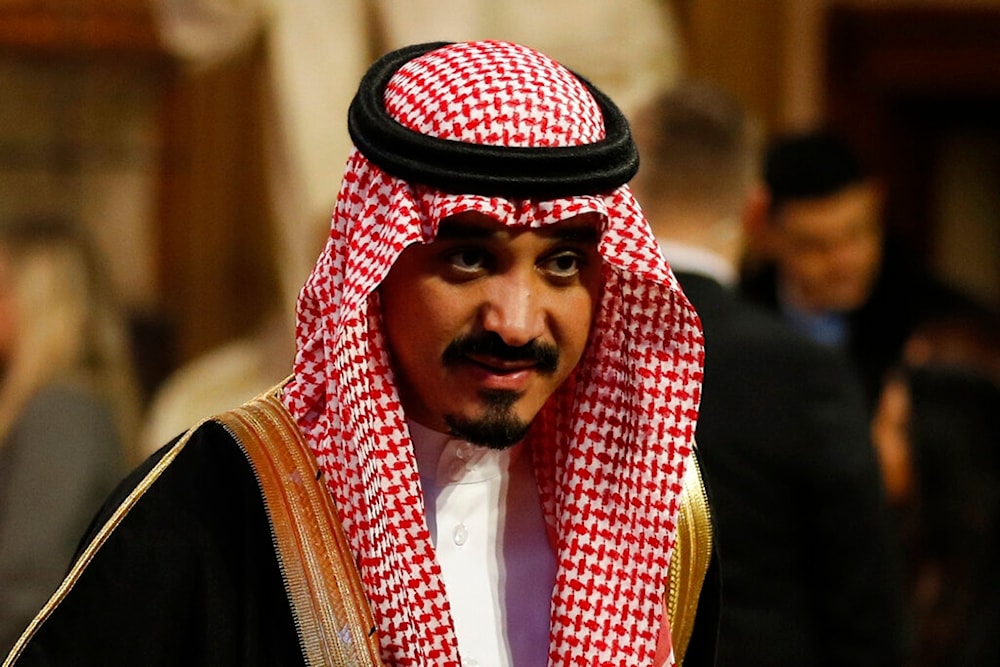S. Arabia says still interested in normalizing ties with 'Israel'
The envoy said that the Saudi Kingdom "was on the verge" of concluding a deal with "Israel" but the plans were averted when the Palestinian resistance launched its operation Al-Aqsa Flood.
-

Saudi Ambassador to the UK Khalid bin Bandar bin Sultan al-Saud walks through the Central Lobby as he attends the State Opening of Parliament, in the House of Lords at the Palace of Westminster in London, Thursday, Dec. 19, 2019. (Adrian Dennis/Pool Photo via AP)
In an interview with BBC News on Tuesday, the Ambassador of Saudi Arabia to the UK expressed interest in establishing normalized relations with "Israel" once the war comes to a complete halt in Gaza. However, he noted that any agreement must pave the way for the establishment of a Palestinian state.
Prince Khalid bin Bandar told BBC that a normalization agreement was on the verge of completion when the kingdom suspended US-brokered talks after the Palestinian resistance launched Operation Al-Aqsa Flood.
He stated that Saudi Arabia still maintains the belief in normalizing ties with "Israel," despite the "deplorable" casualty figures in Gaza. But such ties would not be pursued at the expense of the well-being of the Palestinian people, he noted.
The ambassador also cautioned that there was a "failure of humanity" concerning Gaza, highlighting that the international community was not taking sufficient measures to bring an end to the ongoing conflict.
He also expressed a desire for the UK to "moderate its position" and "treat Israel the same way it treats everyone else." "The blind spot towards Israel is a real problem because it provides a blind spot to peace," he added.
Saudi Arabia, having significance in the Arab and Islamic world, has never officially recognized the Israeli occupation regime since its establishment in 1948. A potential agreement normalizing ties would mark a significant breakthrough for the Zionist regime.
Read more: Dealing with Netanyahu 'incredibly frustrating', US officials say
In late September, the de facto ruler of Saudi Arabia declared in an interview with Fox News that "every day we get closer" to reaching an agreement.
Crown Prince Mohammed bin Salman emphasized the significance of the Palestinian cause, stating that any agreement would need to "ease the life of the Palestinians." However, he did not explicitly state that it would be contingent on progress toward the establishment of an independent Palestinian state.
The official stance of Palestinian leaders is an outright rejection of any deal that does not secure the establishment of a state for them. However, earlier in that month, officials had reportedly privately sought a financial boost and increased control of land in the occupied West Bank as conditions for engaging in the U.S.-backed Saudi-Israel process.
Saudi officials reportedly requested the US to temporarily halt the three-way discussions a few days after the operation on October 7. More than 20,000 Palestinians have been martyred as a result of the Israeli aggression that ensued.
Following his meeting with Crown Prince Mohammed on Monday, US Secretary of State Antony Blinken informed reporters that he had brought to attention the matter of normalization.
"There's a clear interest here in pursuing that," Prince Khalid said. "But it will require that the conflict end in Gaza, and it will also clearly require that there be a practical pathway to a Palestinian state."
The Saudi ambassador noted that there is "absolute interest" among his country's leaders in reaching an agreement.
"[A deal] was close, there is no question. For us, the final endpoint definitely included nothing less than an independent state of Palestine. So, while we still - going forward after 7 October - believe in normalization, it does not come at the cost of the Palestinian people," he noted.
"We were close to normalization, therefore close to a Palestinian state. One doesn't come without the other. The sequencing, how it is managed, that is what was being discussed," he added.
Asked if Saudi Arabia views Hamas as part of the future Palestinian state, Prince Khalid stated, "It requires a lot of thought."
"There is always room for change if you have optimism and hope. But when there is a conflict the first thing you have to recognize is that both sides have lost," he added.
"The problem that we have today with the current government in Israel is there is an extreme, absolutist perspective which does not work to achieve compromise and therefore you are never going to end the conflict."
Though Prince Khalid did not elaborate on the matter, it's worth mentioning that the US recently denounced two extremist Israeli ministers who had advocated for the forced displacement of Palestinians outside Gaza.
Read more: Rwanda denies talks with 'Israel' to take forcibly displaced Gazans in
The Saudi diplomat also cautioned about the risk of radicalization stemming from the war. The genocide, which has resulted in the deaths of thousands of civilians in Gaza, has not only caused widespread devastation but has also led to a profound humanitarian crisis.
"The unprecedented level of violence that has been carried out by both sides - but in particular by what is meant to be a responsible state in Israel - over the past three months, I don't think I have seen anything like it in my life," he said. "The numbers are deplorable, absolutely deplorable."
"That is going to create a lack of hope amongst not just the Palestinian people, but disaffected people [across the world]. All see a failure of humanity in what is happening, because nobody has done anything to stop it. Efforts are being made, but it is not enough."

 5 Min Read
5 Min Read








